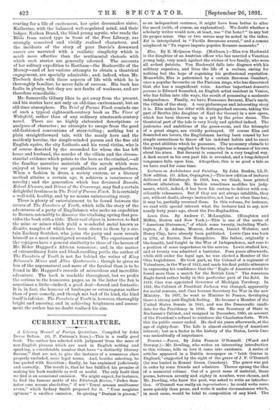Elsa. By E. McQueen Gray. (Methuen.)—Elsa von Hochwald is the
daughter of an Austrian officer who has married a Venetian young lady, very much against the wishes of her family, who were all ardent patriots. Von Hochwald falls into disgrace with his military superiors, and lives the life of a recluse, caring for nothing but the hope of regaining his professional reputation. Meanwhile, Elsa is patronised by a certain Baroness Gambart, once a popular favourite on the Parisian stage, who has discovered that she has a magnificent voice. Another important dramatis persona is Edward Somerled, an English artist resident in Venice, who has fallen into idle ways, the result of possessing a moderate independence. Finally, we have Francesco Savarni, Elsa's uncle, the villain of the story. A very picturesque and interesting story it is. Elsa makes her dAbut with distinguished success, taking the part of Bertha (the daughter of Karl der Grosse) in a new opera, which has been thrown up in a pet by the prima donna. The theatrical part of the tale is very lively and spirited indeed. The jealousies and ambitions of the green-room, and the triumphs of a great singer, are vividly portrayed. Of course Elsa and Somerled are lovers, the Englishman having been roused by her simple earnestness to throw off his indolent habits and to exert the great abilities which he possesses. The necessary obstacle to their happiness is supplied by Savarni, who has schemes of his own about his niece. But Savarni is removed in a very tragical way. A dark secret in his own past life is revealed, and a long-delayed vengeance falls upon him. Altogether, this is as good a tale as we have read for some time.


































 Previous page
Previous page